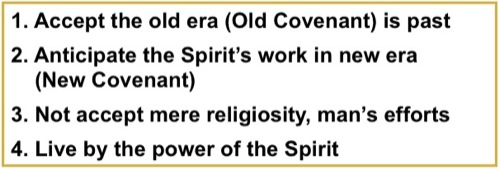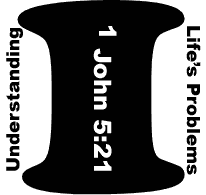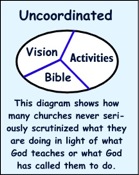
Book of ACTS
Be Saved!
The Bible Teacher's Commentary
on Acts 2:14-40
Paul J. Bucknell
Purpose: The Bible exposition of Be Saved! on Acts 2:14-40 shows the power of the Spirit of God as the birth of the new church era and why three thousand people came to know the Lord on one day.
A. The Explanation of Pentecost
Acts 2:14-21
Acts 2:14-21 | Acts 2:22-36 | Acts 2:37-40
This is part 1 of 3 (excluding the podcast) on Acts 2:14-21 which focuses on the meaning and implications of Pentecost on the year Jesus died. We find powerful evidence of Christ's resurrection and the establishment of the new Gospel age.
Introduction
When the gospel is preached, we might find a few people have been saved. The situation presented here in Acts 2, however, was quite different. Three thousand people were saved! (Acts 2:41). Try imagining the scene. It is not easy. We no doubt are more familiar with a modern urban setting or tranquil farmlands than the crowded and smelly busy Middle Eastern capital city of Israel. Jerusalem was in its typical uproar from all the out of town guests visiting including many from other countries due to the Jewish Feast of Weeks being celebrated.
This is of particular interest because just hours before, the crowd showed absolutely no interest in these matters. Peter now, however, had to clarify that these men and he were not drunk! Peter not only clarifies what was happening to these believers but goes on and powerful preaches the first gospel or evangelistic message after Jesus' time.
A. The Explanation of Pentecost (Acts 2:14-21)
B. The Focus on Jesus Christ (Acts 2:22-36)
C. The Exhortation to the People (Acts 2:37-40)
A. The Explanation of Pentecost (Acts 2:14-21)
If we are going to appreciate Peter's message, we will first need to better understand the unique setting of Acts 2.
Why are these foreigners all in Jerusalem?
This is the Old Testament Feast of Weeks or Pentecost, completed 7 weeks (49 days) from the Passover. This was one of the three main Israeli feasts that the Jewish men needed to annually attend.
"Three times in a year all your males shall appear before the LORD your God in the place which He chooses, at the Feast of Unleavened Bread and at the Feast of Weeks and at the Feast of Booths, and they shall not appear before the LORD empty-handed. 17 Every man shall give as he is able, according to the blessing of the LORD your God which He has given you." (Deuteronomy 16:16-17).
"You shall count seven weeks for yourself; you shall begin to count seven weeks from the time you begin to put the sickle to the standing grain. "Then you shall celebrate the Feast of Weeks to the LORD your God with a tribute of a freewill offering of your hand, which you shall give just as the LORD your God blesses you; and you shall rejoice before the LORD your God, you and your son and your daughter and your male and female servants and the Levite who is in your town, and the stranger and the orphan and the widow who are in your midst, in the place where the LORD your God chooses to establish His name. "And you shall remember that you were a slave in Egypt, and you shall be careful to observe these statutes" ( Deuteronomy 16:9-12).
Tens of thousands if not hundreds of thousands of Jewish believers were there in Jerusalem to celebrate this special feast. They were present in Jerusalem not too long ago, 7 weeks to be specific during the Passover Feast in which they were stirred by the killing of Jesus. Now they are again celebrating another feast, but God again interrupts their traditional holiday with His own special program.

God all along had set His plans in place through the makeup of the Old Testament feasts. They set the stage for God's program. Now that Jesus the Messiah, the Anointed One, has come, things have changed. All these people were all assembled on this day because of the Jewish festival which God initiated long ago.
What about the speaking in tongues?
| 'Tongues' in Acts 2:11 should be translated foreign languages. Although tongues is a possible translation, it would mean the physical organ in the mouth. This usage does not fit the passage.Peter does not specifically mention 'tongues' in his message, but the speaking in different languages forms the very basis of the message (2:1-13). |
Some listeners thought the disciples were speaking foolish things. They could not, of course, understand the foreign languages that the disciples were speaking and that those from those countries could understand. It all seemed so crazy. The only solution that they could come with that they were drunk! "They are full of sweet wine" (2:13).
Peter stated that it is ridiculous to think that they are drunk at 9 a.m. (third hour from the time of dawn). Peter then begins to speak about what the Lord was doing through the work of the Holy Spirit which is connected to the speaking in foreign languages (though it is not specifically mentioned). He does this by quoting from Joel.
Some suggest this is only partial fulfillment of Joel 2. They insist on this because they believe it refers to another greater day ahead. We need to not have our theological biases shape our interpretations. Peter says, "This is ... ." (Acts 2:16).
"And it will come about after this that I will pour out My Spirit on all mankind; And your sons and daughters will prophesy, Your old men will dream dreams, Your young men will see visions. "And even on the male and female servants I will pour out My Spirit in those days. 19 And I will display wonders in the sky and on the earth, Blood, fire, and columns of smoke. "The sun will be turned into darkness, And the moon into blood, Before the great and awesome day of the LORD comes. "And it will come about that whoever calls on the name of the LORD Will be delivered; For on Mount Zion and in Jerusalem There will be those who escape, As the LORD has said, Even among the survivors whom the LORD calls." (Joel 2:28-32).
Evangelism: A message which brings the truth of Jesus Christ's person and work to another so that he might believe in Christ, find forgiveness of sin and possess eternal life. |
Peter is stating that if they wanted to understand what was going on that morning, they would need to see this as a sign of some significant changes. Peter was not the only one preaching but only one of the twelve preaching (2:14). Peter's sermon, however, is what we have recorded before us. The passage that he quotes from Joel is quite significant if not difficult to understand. The most significant aspects is that it signifies both the signs of a new era as well as the closing of the old era. Later he explains how this came about.
(1) Signs of The New Era
First of all, it speaks of a new way God would work among mankind. "After this I will pour out My Spirit on all mankind." We should remember that those from many nations were there that day (all mankind - This theme will develop as we go through the Book of Acts). But equally compelling is the new way God would operate among people not only from Israel but from everywhere. He would pour out His Spirit upon them. We deserved God's wrath but in His great mercy He has poured out His Spirit on mankind. Before going further, however, think historically about this for a moment.
God made man covered with the Spirit of glory after man was made in the image of God in the Garden of Eden. When the Spirit's glory departed from Adam and Eve, they felt naked.
True HumilityPerhaps this is one of the major things by which Moses won the prize for the most humble person on the earth. It would have been easy for his pride of being better, wiser, closer to God, to interfere in his hope that God would work in others. Instead, he desires that more of God’s people have what he has |
Later in Numbers we see God wonderfully working in Moses but he was burdened down trying to care for all those people. God is willing to help Moses properly govern the people and so gives the Spirit of God to others. Two designated men did not assemble before the Lord but remained in the camp, but they prophesied too. Joshua and others pointed out this problem but Moses' response shakes them up. Moses wants more of God's people to share in the wonderful presence of the Holy Spirit.
"Then Joshua the son of Nun, the attendant of Moses from his youth, answered and said, "Moses, my lord, restrain them." But Moses said to him, "Are you jealous for my sake? Would that all the LORD'S people were prophets, that the LORD would put His Spirit upon them!"" (Numbers 11:28-29).
When the Spirit of God comes upon a person, he starts prophesying or doing God-like things. This is indicative of what would happen in the New Covenant. Under the Old Covenant the Spirit of God acted upon a limited and select group of people. Under the New Covenant, as is seen here in this Joel prophecy, the Spirit moves "on all mankind. And your sons and daughters will prophesy, Your old men will dream dreams, Your young men will see visions. "And even on the male and female servants I will pour out My Spirit in those days."
God's Spirit would work in each person even in those of different cultures, languages and tribes.

The Holy Spirit would come upon certain ones and through His anointing perhaps prophesy, heal, speak, etc. This was very limited in the Old Testament but was greatly changed under the New Covenant.
God was doing something new both in degree and means of working. God's Spirit would specially work in all His believers which would be taken from all nations. (This is one thematic message for the Book of Acts which was not quite clear to the Jews at this time). God would 'prove' His purpose and put His stamp on the new work by doing special signs. Speaking in foreign languages was one amazing sign that God was at work in their lives. Remember Peter's words from an event that had not yet happened,
"And as I began to speak, the Holy Spirit fell upon them, just as He did upon us at the beginning. "And I remembered the word of the Lord, how He used to say, 'John baptized with water, but you shall be baptized with the Holy Spirit.' "If God therefore gave to them the same gift as He gave to us also after believing in the Lord Jesus Christ, who was I that I could stand in God's way?"" (Acts 11:15-17).
Peter and others saw God work in some unique way which enabled them to cross over the barriers of traditionalism.
We should not think of the Spirit of God working only in special ways unto salvation but also after salvation. Every believer has a special gift or unction from the Holy Spirit. The Holy Spirit marvelously works in every believer. It is up to each believer to be aware how to step back and let the Holy Spirit marvelously work in their lives. These gifts are given from the Lord to allow the Spirit to fully work through the lives of His people (read more on spiritual gifts for a deeper understanding).
Joel speaks about prophesies, visions and dreams. The Lord could have given these prophetic messages without the gift of speaking foreign languages but did not. The speaking of foreign languages had at least four purposes:
Speaking in foreign languages was clear evidence that God was indeed giving special prophetic messages to different individuals. They were not speaking on their own.
God was demonstrating that He was now not only working with the priestly or prophetic class of men but with all kinds of people including men and women, young and old and even slaves. "Your sons and daughters will prophesy, Your old men will dream dreams, Your young men will see visions. "And even on the male and female servants I will pour out My Spirit."
God now was reaching people from all nations. The gospel was for all the nations. "I will pour out My Spirit on all mankind."
These were not only signs but as we later see the messages were used to powerful touch the hearts of the people. (See Acts 2:41 "added that day" about three thousand souls).
(2) Signs of the Old Era Passing Away (Acts 2:19-20)
The signs of the new era followed signs from the old era passing away. If the signs of the new era were difficult to comprehend, these signs of the old passing away might seem even more difficult to grasp.
19 AND I WILL GRANT WONDERS IN THE SKY ABOVE, AND SIGNS ON THE EARTH BENEATH, BLOOD, AND FIRE, AND VAPOR OF SMOKE. 20 THE SUN SHALL BE TURNED INTO DARKNESS, AND THE MOON INTO BLOOD, BEFORE THE GREAT AND GLORIOUS DAY OF THE LORD SHALL COME." (Acts 2:19-20).
It is interesting that Peter did not stop with verse 18 in the quote from Joel 2. Peter could have clarified what God was doing only by speaking about the Spirit's work in His people on that day, but he went on and clarified the end of the old era.
Confusion of the new era will persist
until the closure of the old era is clear.
Most of the great difficulties that the disciples and the Apostle Paul faced were due to confusion about the ongoing nature of the Old Covenant. Paul was thrown in jail and beaten again and again because he preached that keeping the law was not necessary to gain God's acceptance. So what are the signs of the Old Testament passing away?

First of all, we should see that Peter is in fact declaring that we are "in those days" (Ac 2:18) that were repeatedly looked forward to in the Old Testament.3 "In the last days" is also repeatedly used (Acts 2:17). A whole new kind of day or era would come. It is important to recognize that this important 'day' (time period) comes about because of underlying changes, namely, the new covenant replaces the old covenant.
Second, we already discussed the signs signifying God's new way of working (Acts 2:17-18).
Third, we find there are signs of discontinuing of the old way (i.e. Old Covenant). Let's examine these now. Four phrases are mentioned though we see some of them perhaps refer to the same thing (the parallelism is clear).
- Wonders in the sky above
- Signs on the earth beneath, blood, and fire and vapor of smoke
- Sun shall be turned into darkness
- Moon into blood
The description here is very hard for those raised in the Western community to understand. Those trained with scientific accuracy down to decimal places often have difficulty understanding this kind of poetic and symbolic language. The symbols point to real events but not specific as the moon literally turning into real blood.
Our minds should first turn to what happened when Jesus the Messiah was rejected and murdered. Many great things happened both in the sky and on the earth as indicated by the verses. Included are a great earthquake, many rose from the dead, the sky went completely dark for three hours when the sun should have shone at its greatest and the veil of the temple was torn in two (observe Rev. 6:12).
"Now from the sixth hour darkness fell upon all the land until the ninth hour." (Matthew 27:45). "And Jesus cried out again with a loud voice, and yielded up His spirit. And behold, the veil of the temple was torn in two from top to bottom, and the earth shook; and the rocks were split, and the tombs were opened; and many bodies of the saints who had fallen asleep were raised" (Matthew 27:50-52).
Surely the cry of the centurion came out with the proper understanding, "Truly this was the Son of God!" (Matthew 27:54). These were many great signs that were happening that signified the change of administrations. Luke, who also wrote Acts, also mentioned these in Luke 23:44-45. The moon probably did look red. Peter freely quoted it and so it probably happened on the day Jesus hung on the cross. We do not have a way to directly confirm it through testimony.

Some will wonder whether this is what we should understand by what Joel had prophesied many years earlier and which Peter affirmed, "This is what was spoken of ..." (Ac 2:16).
This makes the most sense. Remember that they had just been in Jerusalem to witness all these things. All of Jerusalem went pitch black. All of Jerusalem had a huge earthquake. They all heard about the temple veil being torn. Peter is putting it all together for them.
In the next section Peter goes on and articulates these very things: Jesus' signs and death and resurrection. Jesus is the focus here. Putting to death the "Son of God" had serious consequences for Israel. They rejected God in the most serious way. God now has rejected them and reached out to the nations (see Paul's convincing argument in Romans 11). "For if their rejection be the reconciliation of the world, what will their acceptance be but life from the dead?" (Romans 11:15).
It was because of the Jews hardness that they were broken off and the nations were allowed in. We see the great change take place when the signs of the heavens (darkness) and earth (earthquake) and God-man events (veil torn) took place.
This was part of a greater change as God took steps to judge Israel as a nation. This would take place in another 35 years or so in 70 A.D. by the Roman army. That was a devastating destruction of Jerusalem predicted by Jesus closely recorded by Josephus the Historian.
"And they will fall by the edge of the sword, and will be led captive into all the nations; and Jerusalem will be trampled under foot by the Gentiles until the times of the Gentiles be fulfilled. "And there will be signs in sun and moon and stars, and upon the earth dismay among nations, in perplexity at the roaring of the sea and the waves" (Luke 21:24-25).
Notice again the connection of "the times of Gentiles" (where they are reached by the Gospel) and the signs in 21:25. Luke wrote this and was quite aware of all of this as he penned Acts 2. There are many theological insights and problems that find their way out of this passage, but we will be content to focus on the signs and turn to how Peter interprets the introduction of this new era in the following verses.
Next -> B. The Focus on Jesus Christ (Acts 2:22-36)
BFF -> Moving our generation's heart and mind closer to the Lord through the powerful truths of God!






